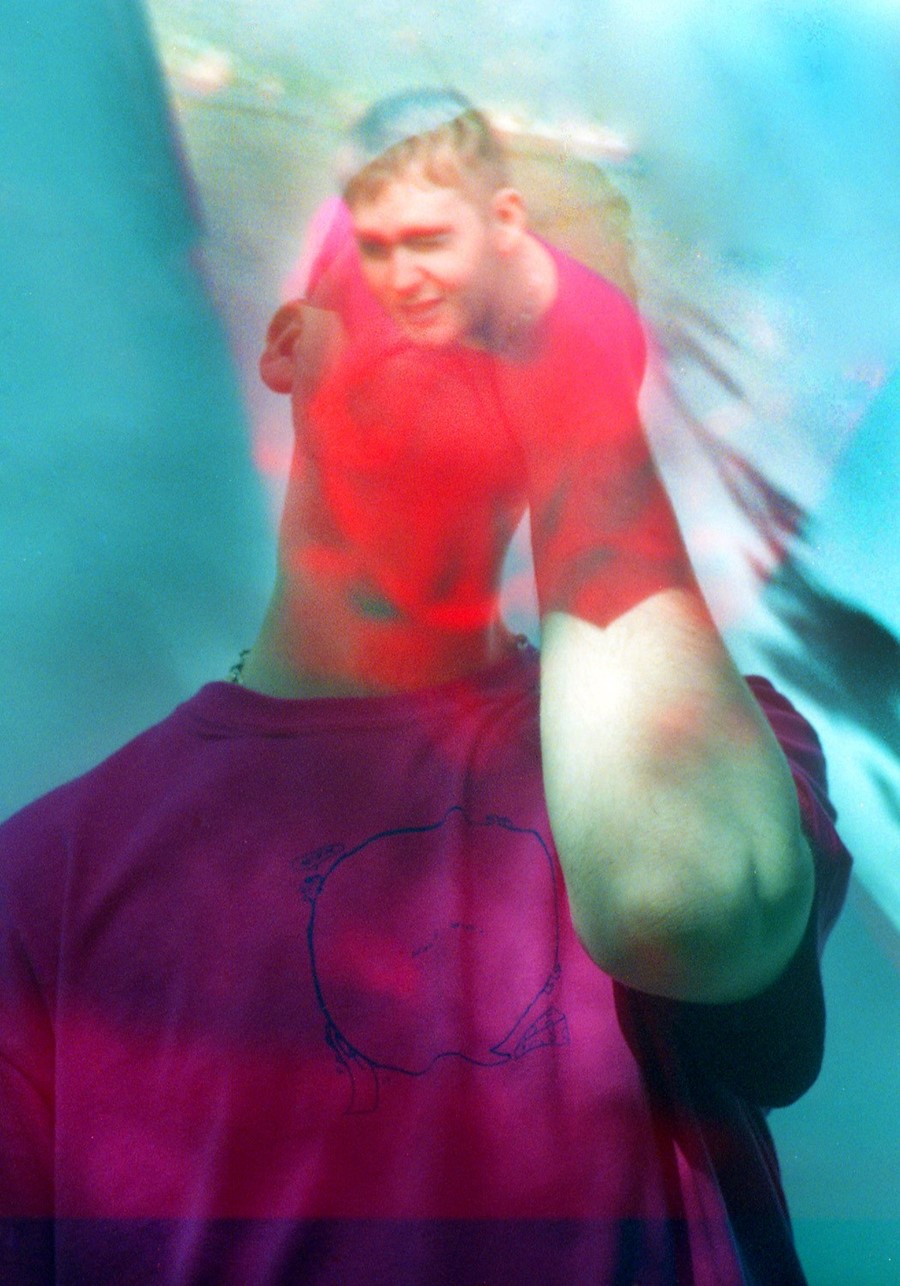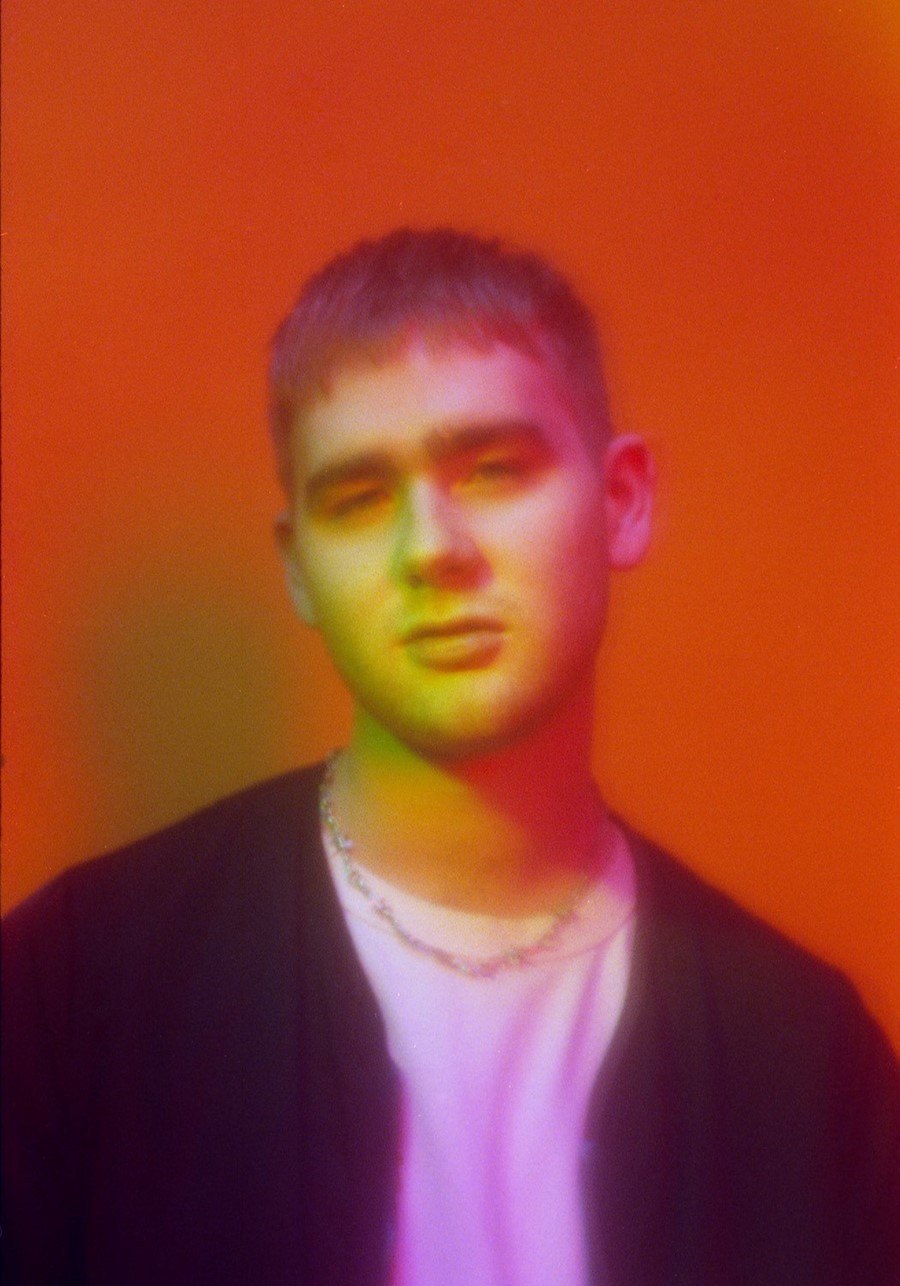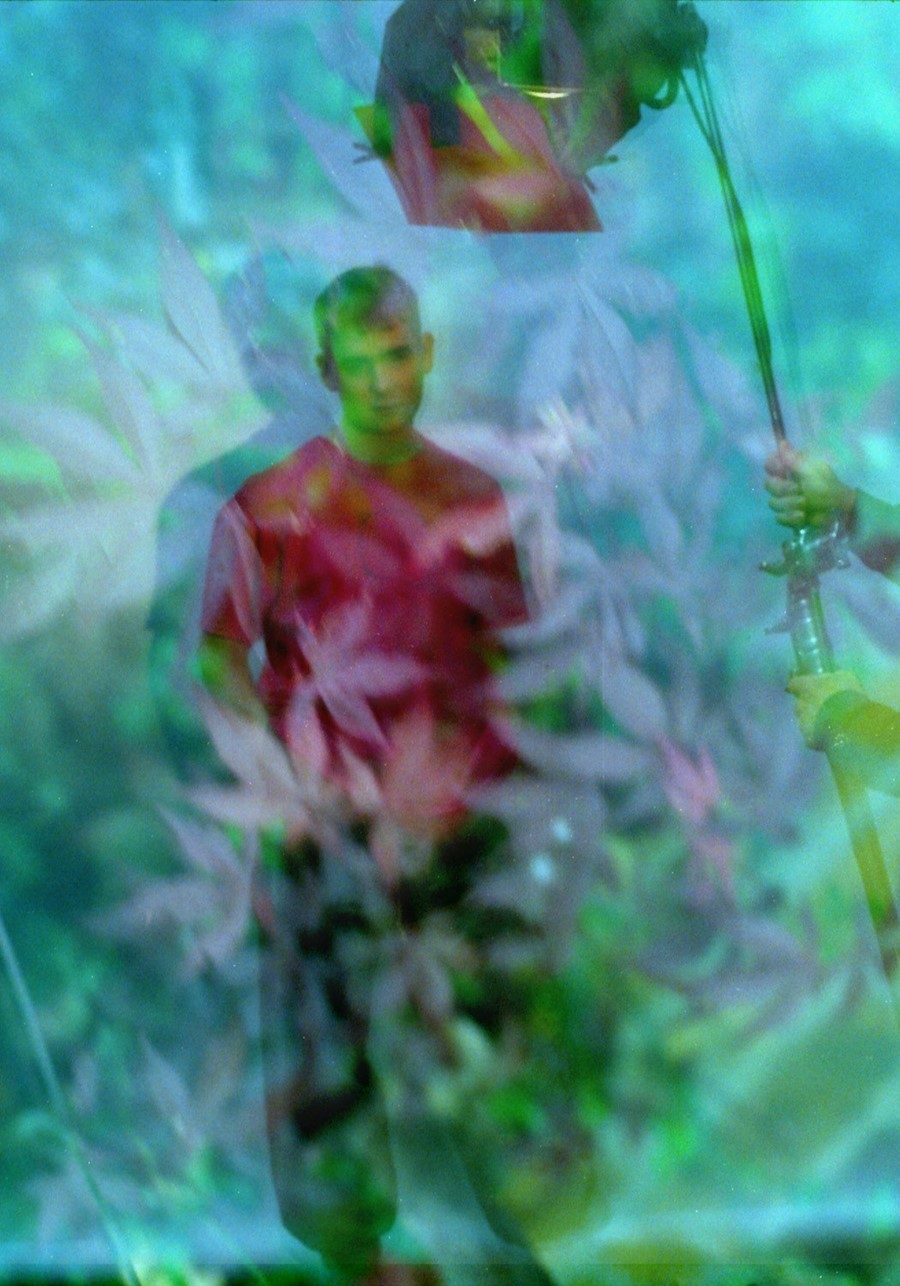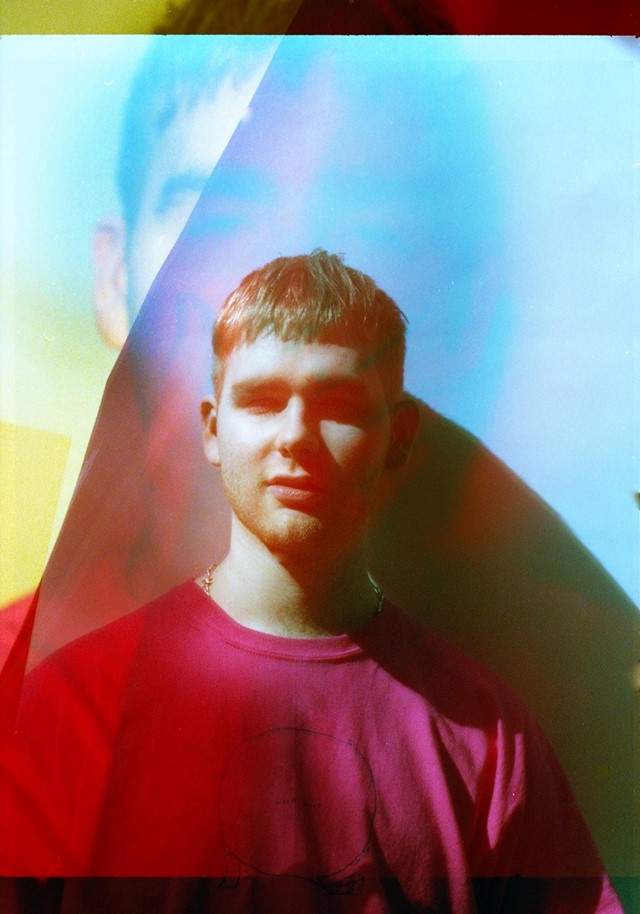Mura Masa on His Second Album and the “Mental Strife We’re Dealing With”
- TextAlex Denney
Mura Masa’s new album R.Y.C (Raw Youth Collage) is almost here. Speaking to Alex Denney, the producer reveals the story behind the record
About halfway into our conversation, Alex Crossan tries to sum up his feelings about the internet with an extraordinary, lupine metaphor. “It’s like being out for dinner with this big fucking huge beast that’s eating its dinner very politely,” says the producer also known as Mura Masa, laughing at the image, “but you also know it’s capable of something horrible and could destroy you at any moment, and you don’t really understand its motive for being there.”
In truth, the internet’s been kind to the 23-year-old musician, who grew up on the Channel Island of Guernsey (population: 63,000) before carving his name as a producer, first in Brighton and then in London. On Guernsey, there was one nightclub (now closed) and people tended to fall into one of two camps musically, repping either metal or folk. But, thanks to the miracle of wifi, the teenage Crossan had a “telescope” into musical trends on the other side of the channel, parlaying his love of producers like Hudson Mohawke and Mount Kimbie into a career of his own. Since then, he’s gone on to work with A-listers like A$AP Rocky, Damon Albarn and Nile Rodgers, picking up a pair of Grammy nominations for his self-titled first album in 2018. (He went one better this year, winning for his remix of Haim’s Walking Away.) Style-wise, the record was a breathless amalgam of styles – trap, glitch-hop, garage – reflecting the expanding musical consciousness of its creator.
All things considered, it’s a stellar start to a career that makes his new record, Raw Youth Collage, all the more puzzling – with Crossan himself singing on all the tracks, it’s an unabashedly emo, guitar-led album tackling all manner of contemporary ills from the mental health crisis to retro culture and, especially, the big, bad wolf of the internet. But it’s also loads more fun than the heavy capital-t Themes would suggest, a deeply personal statement with a signature lightness of touch shining through on tunes both thrillingly epic (Teenage Headache Dreams, with Wolf Alice) and laugh-out-loud funny (slowthai’s anti-gentrification rant Deal Wiv It).

What was it like growing up in Guernsey?
Normally when someone says they’ve got a friend in Guernsey I ask who it is and I’ll be like, ‘Oh yeah, I went to school with their brother!’ Even if you went to different schools, there’s only so many pubs. There was one club when I was growing up and by 1am the whole island would be in there. The club’s closed down now, it’s shit.
Did you know you wanted out from an early age?
I felt there was more world to see, and not everyone in Guernsey feels that – not in a bad way, necessarily, but I went to uni in Brighton and it was an eye-opening experience for me, because Guernsey is quite conservative politically and Brighton is just the total opposite of that. Before that I’d been in a few punk bands and weird function bands. There was no electronic scene in Guernsey – either you were into metal or folk. I was kind of a metalhead, but then I’d credit the internet with a lot of my self-discovery and music taste.
Thank God for the internet, hey?
In many ways, but in other ways not so much [laughs]. The internet was like my telescope into popular culture. I started making music on my own when I was 15, 16, so by the time I went to uni I’d already developed some production skills and some music taste other than metal or punk.
You’ve spoken before about Hudson Mohawke as an important influence for you starting out, I guess he was part of the first wave of producers to really sound like they’d come up on the internet, wasn’t he? He really just throws it all into the mix with his music.
Yes and I think we’re still living with the development of that idea, that everything is an amalgam, a kind of news feed, there’s not any one ‘source’. It’s about seeing a lot of ideas all at once, and that’s starting to apply to pop music as well. You can see it in someone like Billie Eilish, who has got her own thing going with all these myriad influences.
You dropped out of uni to pursue music in London, was that another culture shock for you?
Yeah, but in an exciting way. A lot of that fed into my first album, discovering all those new sounds and trying to situate them. People are from everywhere in London, that’s what makes it amazing. I always compare it to Tortuga in Pirates of the Caribbean, it’s this weird place where all the pirates from all the different islands meet and hang out. No one is actually from there but that’s where they all go – that’s how London always felt to me.

Do you think your upbringing lends an outsider-ish sensibility to your work?
I think early on I was disappointed that I didn’t sound like everyone else, but then you come to realise that’s a strength. On my first album I was very overwhelmed by all these crazy influences. It’s quite confusing sonically; I was back-educating myself in the lineage of English music and the history of all these scenes. But the new album is more lasered in on a specific thing. I went in with much more of a concept and wrote around that.
What was the concept?
The overarching theme is nostalgia. I noticed a lot among friends and in my own life that there’s a yearning for regression and trying to rediscover happiness from things in the past. It’s there in all the reboots and rehashes – I went to watch Joker the other night and the trailers were for the Terminator sequel, a Bad Boys reboot with Will Smith and another chapter to The Shining. If there was any movie that didn’t need fucking touching it’s Kubrick’s! You can even be nostalgic for things you didn’t even experience now, like jungle music or 90s rave. So the album is about why we need to do that, whether it’s a [valid] way to find some joy in the weird times we live in.
How do those themes tie into the music on the album?
The album takes the form of this weird, warped idea of things I grew up listening to – there are a lot of Talking Heads and Joy Division references, things I didn’t get to experience first time around. I decided to make a guitar album, essentially.
You sing on every track on the new album, which will surprise many of your fans. What made you decide to step up?
It just came out of utility, really. I felt that if I wanted talk about personal issues then I needed to do a bit of talking myself, because there’s a lot more vulnerability with this music than there has been in the past. There was also much more scrutiny on the collaborators [this time]. All the voices on the album are people who speak already in their own music to these themes. Slowthai being the most obvious one, in his political outspokenness and his optimistic attitude towards life.
How did that that song [Deal Wiv It] come together? Did you give him a brief?
I played him a bunch of Stranglers tracks; [I was trying to make something] like older punk music but not done how you would imagine it. I think really I just wanted to hear a slowthai song where slowthai isn’t rapping. It was all improvised; there’s this 20-minute version of the song where he’s just ranting on how much a pint costs and how his girlfriend doesn’t love him, over time he develops the character that you end up hearing in the song. We’ll have to release it because it’s genius; he never repeats himself once.

Were there any collaborators you were unable to get on the record?
Umm. There was one person who was very busy, he’s doing a Broadway show at the moment and we couldn’t quite make it work. He’s a very distinguished member of a famous punk band: I might end up working with him in the future, but it didn’t quite come off this time.
How about some of the other guests on the record? You collaborated with Clairo for the first single [I Don’t Think I Can Do This Again].
I think Clairo is a very interesting example of a lot of the things we’ve just been talking about, about the internet as a lens to see music through. She’s at the forefront of a burgeoning reinvention of the DIY scene in America and I think she’s on the edge of something super-special; I’m glad I caught her when I did. We ended up writing a song about not wanting to relive teenage heartache and it slotted right in, it really just suited the album.
I was excited to see Tirzah on there, too.
Yeah, that one’s a dream come true. That took a while actually, I don’t think she works with anyone part from Mica [Levi] so I’m all the more grateful for that.
You mention the punk influence on the album, but a lot of the tracks sound quite emo to me, especially No Hope Generation.
Yeah! [A track like] No Hope Generation has this sort of whiney, American midwestern feel to it. Lyrically it’s more messaged than anything I’ve done before, it’s kind of a manifesto for the album. Really what I’m asking is why it’s so shit for 20-somethings at the moment, why do we all feel this collective gloominess? But it’s also supposed to be joyful. A joyful realisation of how shit everything is! It’s like ‘Well, how do we move on, how do we start talking about it?’ I say “I need help” about 30 or 40 times in the song; I think there’s something in that.
Are you OK?
I’m good, I’m good! During this album I started going to therapy and I’ve started to try and affirm some of this mental strife we’re dealing with, you know? For all the lamenting, self-facing, screwface lyrics on the album, there’s a lot of joyful remembering, too.
Mura Masa’s new album R.Y.C (Raw Youth Collage) is out on January 17, 2020. His new single No Hope Generation is out now.












